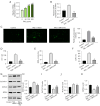Total Astragalus saponins promote ferroptosis in gastric cancer cells by upregulating SIRT3
- PMID: 40104701
- PMCID: PMC11912042
- DOI: 10.21037/tcr-24-1421
Total Astragalus saponins promote ferroptosis in gastric cancer cells by upregulating SIRT3
Abstract
Background: Gastric cancer (GC) is a malignant tumor of the digestive tract originating from the epithelial cells of the gastric mucosa, which is highly invasive and heterogeneous, posing a serious threat to human health. In recent years, ferroptosis, as a novel mode of programmed cell death, has shown potential anticancer effects in tumor therapy. Total Astragalus saponins (TAS), a natural product derived from Astragalus membranaceus, have been shown to possess various pharmacological activities, including anticancer effects. This study aimed to investigate the effects of TAS on GC cells, focusing on the mechanism of action of its regulation of the silent information regulator 3 (SIRT3) in inducing ferroptosis in GC cells.
Methods: We treated SGC-7901 cells with TAS at concentrations of 50, 100, and 200 µg/mL. After TAS treatment, the SGC-7901 cells were transfected with a vector designed to knock down SIRT3 expression. We assessed cell proliferation, viability, and apoptosis using 3-(4,5-dimethylthiazol-2-yl)-2,5-diphenyltetrazolium bromide (MTT assay), colony formation assay, and flow cytometry. SIRT3 expression was measured by real-time quantitative reverse transcription polymerase chain reaction (qRT-PCR). Fe2+, malondialdehyde (MDA), lactate dehydrogenase (LDH), and superoxide dismutase assay kits were used to detect the level of reactive oxygen species (ROS) by fluorescent probe assay. Western blot was used to detect apoptosis-related proteins and SIRT3 protein expression.
Results: TAS dose-dependently inhibited SGC-7901 cell proliferation and viability (P<0.05) and induced apoptosis (P<0.05). TAS promoted the expression of SIRT3 and ACSL4 proteins (P<0.05), inhibited the expression of SLC7A11 and GPX4 proteins (P<0.05), and induced ferroptosis of SGC-7901 cells (P<0.05). Knockdown of the SIRT3 gene attenuated the effect of TAS treatment on ferroptosis (P<0.05).
Conclusions: TAS has therapeutic potential for GC and can effectively inhibit the proliferation and viability of SGC-7901 cells, and the mechanism may be that TAS upregulates SIRT3 to promote the ferroptosis of SGC-7901 cells.
Keywords: Gastric cancer (GC); ferroptosis; silent information regulator 3 (SIRT3); total Astragalus saponins (TAS).
Copyright © 2025 AME Publishing Company. All rights reserved.
Conflict of interest statement
Conflicts of Interest: All authors have completed the ICMJE uniform disclosure form (available at https://tcr.amegroups.com/article/view/10.21037/tcr-24-1421/coif). The authors have no conflicts of interest to declare.
Figures



References
-
- Si YT, Xiong XS, Wang JT, et al. Identification of chronic non-atrophic gastritis and intestinal metaplasia stages in the Correa's cascade through machine learning analyses of SERS spectral signature of non-invasively-collected human gastric fluid samples. Biosens Bioelectron 2024;262:116530. 10.1016/j.bios.2024.116530 - DOI - PubMed
LinkOut - more resources
Full Text Sources
Miscellaneous
